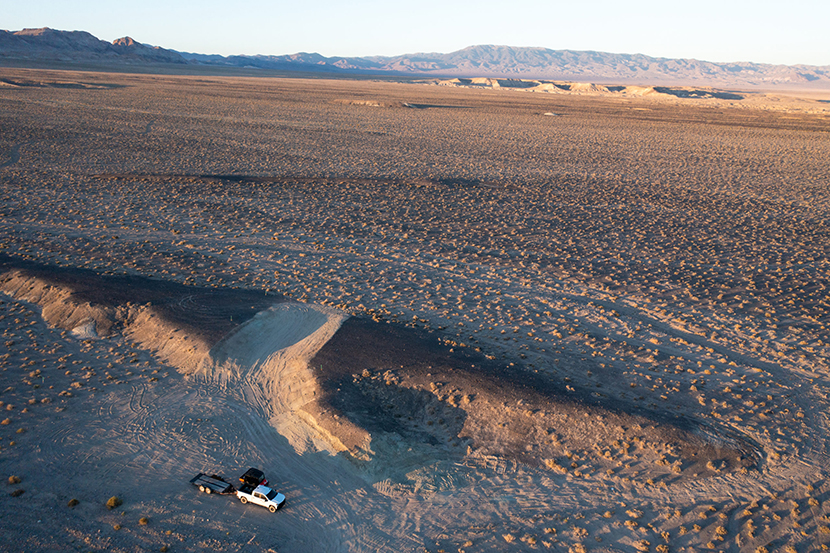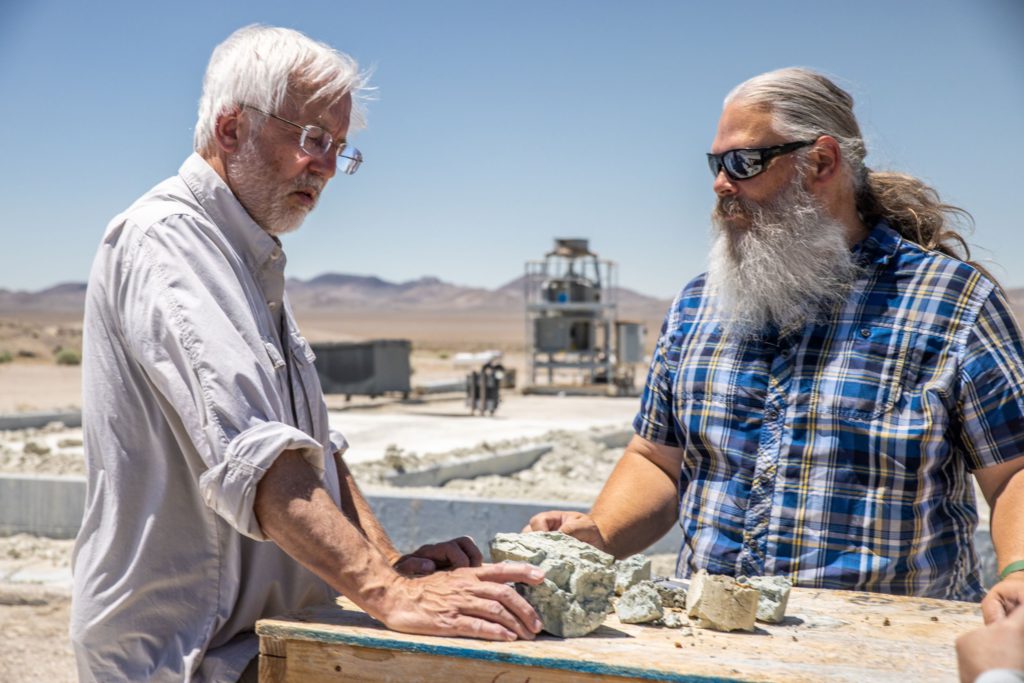JV Article: Century Lithium signs engineering contract with Koch Technology Solutions

Century Lithium (TSXV: LCE; US-OTC: CYDVF) is on track to complete a feasibility study by mid-year on its 100%-owned Clayton Valley lithium claystone project in southwestern Nevada, with a plan of operations to follow.
The Vancouver-based company, which changed its name from Cypress Development in January, is already processing material at a nearby pilot plant from its lithium-bearing claystone deposit, which sits immediately adjacent to Albemarle Inc.’s (NYSE: ALB) Silver Peak lithium brine operation, the only commercial lithium operation in North America.
In February, the company announced a collaboration agreement with Koch Technology Solutions (KTS), a Koch Engineered Solutions (KES) company, to apply the trademarked Li-Pro process for direct lithium extraction (DLE) at Century Lithium’s lithium extraction pilot plant in Nevada’s Amargosa Valley.

Credit: Century Lithium
“Our DLE process in the pilot plant is performing very well and we are excited to work with Koch as we advance the project,” says Bill Willoughby, Century Lithium’s president and CEO, noting that Koch is one of the largest engineering companies in the world.
“We will be testing Koch equipment with our project’s material to see how it performs,” says Willoughby, an engineer with a Ph.D in mining engineering and metallurgy. “Our goal with Koch is to create a design to efficiently advance our process. Koch could step in and construct a full-scale DLE plant for the project. It would be a turnkey set up, they would provide us with the engineering, design, and structure.”
KTS will also provide engineering design and costs for the full-scale DLE portion of Century Lithium’s processing plant. The testing of the Li-Pro process is independent from the feasibility study and will begin upon delivery of KTS equipment. Century Lithium will fund the study, installation, and operation of the equipment at the pilot plant, and KTS will provide training and technical support.
Century Lithium purchased a licence for the Lionex DLE process in March 2022, and KTS subsequently acquired the Lionex technology from Chemionex, which has been integrated into KTS' Li-Pro process.
The deal with Koch follows an agreement Century Lithium completed in October, with German engineering company thyssenkrupp nucera. Thyssenkrupp is designing a chlor-alkali plant for the project as part of the feasibility study. The plant will be a cornerstone of the process and will allow the company to generate two reagents necessary for processing lithium-bearing claystone through to lithium carbonate.
“We are engaging experienced and well-connected companies like Koch and thyssenkrupp to assist us as we move forward in our project,” says Willoughby. “Thyssenkrupp engineers and builds acid plants with a world-wide presence, and now we have a company capable of helping us meet our goals at the project.”
While the bear market has had investors fretting over Russia’s invasion of Ukraine, interest rate hikes, a looming recession, and the Covid-19 related lockdowns in China, Century Lithium has been quietly hitting major milestones over the last 12 months at Clayton Valley.
The company kicked off 2022 with an oversubscribed, bought-deal financing of C$18.1 million ($13m), and in February Century Lithium hired Wood PLC and Global Resource Engineering to begin a feasibility study.
The company also acquired Enertopia Corp.’s (US-OTC: ENRT) Clayton Valley lithium project, immediately adjacent to Century Lithium’s project. That property has an indicated resource of 82 million tonnes grading 1,121 parts per million (ppm) for 0.49 million tonnes of lithium carbonate equivalent (LCE) using a cut-off grade of 400 ppm.
The feasibility study will incorporate these resources into the Century Lithium project’s indicated resource of 1.3 billion tonnes grading 905 ppm lithium for 6.3 million tonnes of LCE using a cut-off grade of 400 ppm.
In April, the company collected a 500-tonne bulk sample. The material was crushed and processed for use at the pilot plant and the scale and method of processing was designed to mimic the company’s proposed processing plant for the project.
In May, Century Lithium conducted a sonic drilling program during which it collected 6-inch-diameter, continuous cores to provide material from different areas and depths of the deposit for use and study at the pilot plant. The drilling program confirmed previously reported lithium grades for the property as well as the property acquired from Enertopia. The project’s resource model was further confirmed with collective assays from the drill holes, which fell within 2% of the lithium grades predicted by the model.
“The drill program was highly successful in generating material for our pilot plant and providing distinct data to strengthen the project’s resource model,” Willoughby says.
For the duration of the year, Century Lithium trialed lithium extraction at its pilot plant at a rate of 1 tonne per day over varying continuous periods, which generated a large amount of data for the project. Processing and design alterations are being utilized to improve lithium recovery from the deposit’s lithium-bearing claystone.
The company reached a significant milestone when it delivered about 2,000 litres of concentrated lithium chloride solution from its pilot plant to Saltworks Technologies, in Richmond, British Columbia.
Saltworks Technologies successfully produced battery-grade lithium carbonate from Century Lithium’s concentrated lithium solution. Independent analysis by SGS Canada confirmed results of greater than 99.9 weight-percent purity in a scalable process validating Century Lithium’s lithium extraction process.
“The lithium extraction results, plans to finish the feasibility study, and a plan of operations has Century Lithium in a good position to move forward,” Willoughby says.
“The whole space is getting hot, things are picking up, and the lithium space is not slowing down at all,” adds Spiros Cacos, the company’s vice-president of investor relations. “We’re a company at the right stage, at the right time, and in the right jurisdiction.” To buttress his claims, he points to several deals that lithium companies in the U.S. have made in recent months.
In January, the U.S. Department of Energy offered a 10-year $700 million loan to help finance construction of Ioneer Ltd.’s (NASDAQ: IONR; ASX: INR) Rhyolite Ridge lithium-boron project in Nevada. The loan is part of a program to support the Biden Administration’s critical minerals strategy. The loan followed a binding offtake agreement Ioneer signed with Ford Motor (NYSE: F) in July 2022 to supply the carmaker with 7,000 tonnes of lithium carbonate per year over a five-year term starting in 2025.
General Motors (NYSE: GM) and Lithium Americas (TSX: LAC; NYSE: LAC) also announced in late January that they would jointly invest to develop the Thacker Pass lithium mine in Nevada. Under the agreement General Motors will make a $650 million equity investment in Lithium Americas.,
“The U.S. would like to have as much domestic supply as possible,” says Willoughby. “Right now, there are over a dozen battery plants under construction, or on the table. There will be 650,000 (LCE) tonnes of new supply required to meet the demands of these future battery makers.”
Century Lithium’s Clayton Valley project will become a cornerstone producer in the U.S., he forecasts. “Expanding demand for lithium worldwide — with all car makers shifting to electric vehicles — is going to continue to put pressure on supply,” says Willoughby. “There will be a need for alternative sources of lithium and our lithium clay deposit is one of the largest lithium deposits in America.”
The preceding Joint Venture Article is PROMOTED CONTENT sponsored by Century Lithium and produced in co-operation with MINING.com. Visit www.centurylithium.com for more information.



Comments